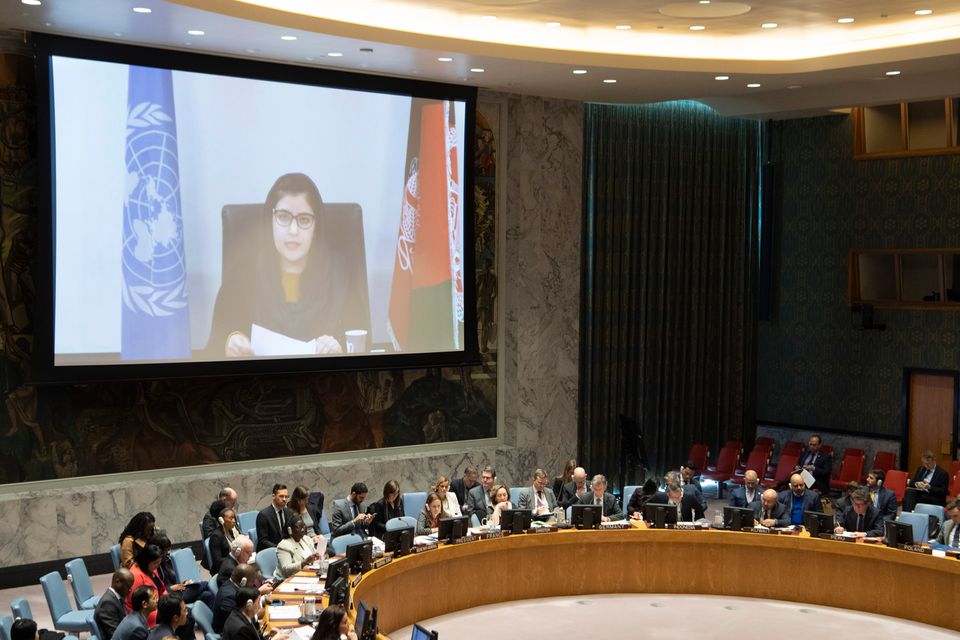Unprecedented opportunity for peace in Afghanistan
Statement by Stephen Hickey, UK Political Coordinator at the UN, at the Security Council Briefing on Afghanistan.

Madam President, let me begin by expressing our condolences to all of those killed and affected by the tragic air crash in Ethiopia. Let me also thank our briefers today. First, SRSG Yamamoto; UNAMA continue to do vital work in very difficult circumstances. Also to National Security Adviser Mohib; we were very encouraged to hear your personal commitment to reform, to women’s empowerment and also to credible elections taking place later this year. And of course to Ms. Tapesh; for your very powerful words on the importance of involving women in all aspects of the political process and in safeguarding women’s rights in Afghanistan. Thank you.
Madam President, I’d also like to take this opportunity to condemn the recent attack on those Afghans attending the commemoration of the death of Abdul Ali Mazari and express our deepest sympathy for those affected. This recent attack was a very tangible demonstration of the challenges we face collectively in ensuring the protection of civilians and politicians of all ethnicities and space for peaceful dialogue in Afghanistan.
Madam President, we join the Dominican Republic and other speakers today in being deeply concerned by the 10,993 record civilian recorded civilian casualties of the armed conflict in 2018 and the 11% increase in civilian deaths recorded by UNAMA in the last year. As the Security Council, we must remind all parties that any targeting and killing of civilians are serious violations of international humanitarian law and we support enormous efforts to ensure that protection remains at the core of the humanitarian response in Afghanistan.
Madam President, we often sit in this chamber and talk about what a crucial time we are entering in defining Afghanistan’s future. This is especially true today as we approach important elections that underpin political stability in the country.
As my Indonesian and Belgian colleagues have already recognised today, it’s very important that lessons are learned and are rapidly addressed from October’s parliamentary elections to ensure that this year’s presidential vote is transparent credible and inclusive. We recognize the efforts by Afghanistan’s electoral management bodies to address many of these issues but the new Election Commissioners face a formidable task. There is a great deal still to be done to deliver a credible vote on the 20th of July. We urge you UNAMA to work closely and urgently with the new commissioners to identify priorities, highlight where key milestones are not being met and to lead the international community’s response. We would also welcome a clear and pragmatic plan for voter registration and verification systems that will be used for July’s vote.
Once again Madam President, we would ask the Mission to consider what more UNAMA can do and what additional resources it needs to strengthen support ahead of the forthcoming elections. And we would welcome detailed updates from the UN on this priority issue in the coming months. Forthcoming elections are crucial for Afghanistan. Both the international community and the Afghan government can and should focus on this even while we continue to support and drive progress towards a long-term political settlement to the conflict. We are therefore strongly supportive of all efforts to start a credible and sustainable Afghan-led and owned peace process to resolve the conflict. As Germany has already noted today, the current opportunity for peace is unprecedented and Afghanistan, its neighbours and the wider international community should do everything possible to seize it.
The forthcoming Kabul Process meeting will provide a good opportunity for the international community and the region to take stock and work out how best to support Afghan peace efforts and we are particularly supportive of the efforts being led by U.S. special representative Zalmay Khalilzad including to kickstart the intra-Afghan dialogue that must lie at the heart of any efforts towards an Afghan-led and Afghan-owned political settlement.
Madam President, I want to turn now to the points made by Ms. Tapesh earlier today. As progress is being made in the path towards women’s meaningful participation in all levels of decision making from the local community to the negotiation table, it’s essential that we maintain momentum. This is not just because it’s the right thing to do. It’s also because analysis suggests that the sustained and empowered involvement of women makes any peace process much more likely to succeed. It’s positive that there are an increasing number of women on the High Peace Council but more can be done to ensure that women’s voices are represented.
Any political settlement should protect the progress achieved on human rights and gender equality in Afghanistan over the past 18 years. This will require patience given the distrust between the parties and the history of the conflict. It will also require the international community to be united in its demand for the Taliban to sit down with other Afghans and in particular representatives of the internationally recognised Government. The Taliban claim that they are serious about peace. They need to realize that peace requires compromise and dialogue. All other parties are ready to engage in this with an open mind. We should all call upon the Taliban to do the same. Thank you Madam President.